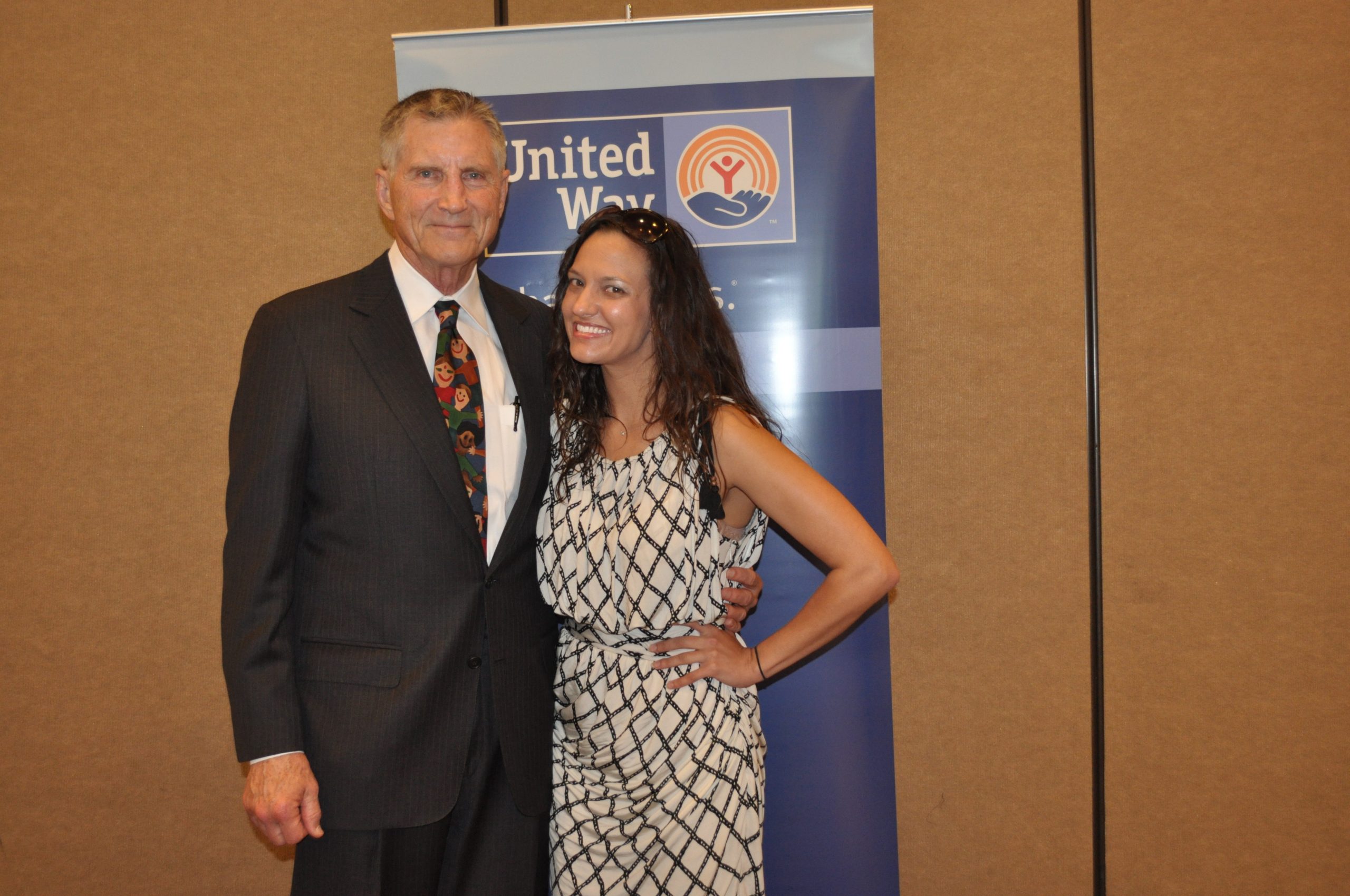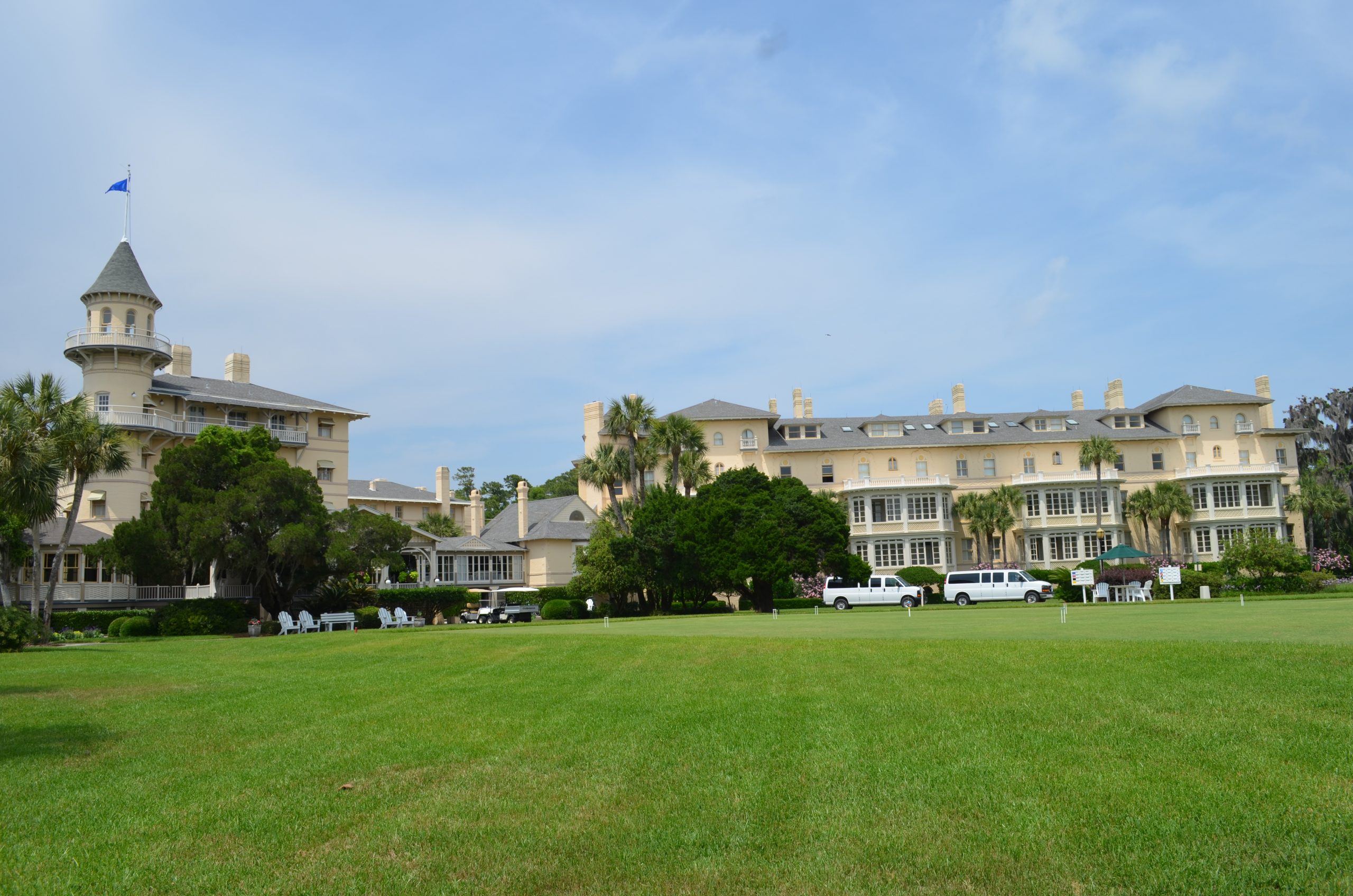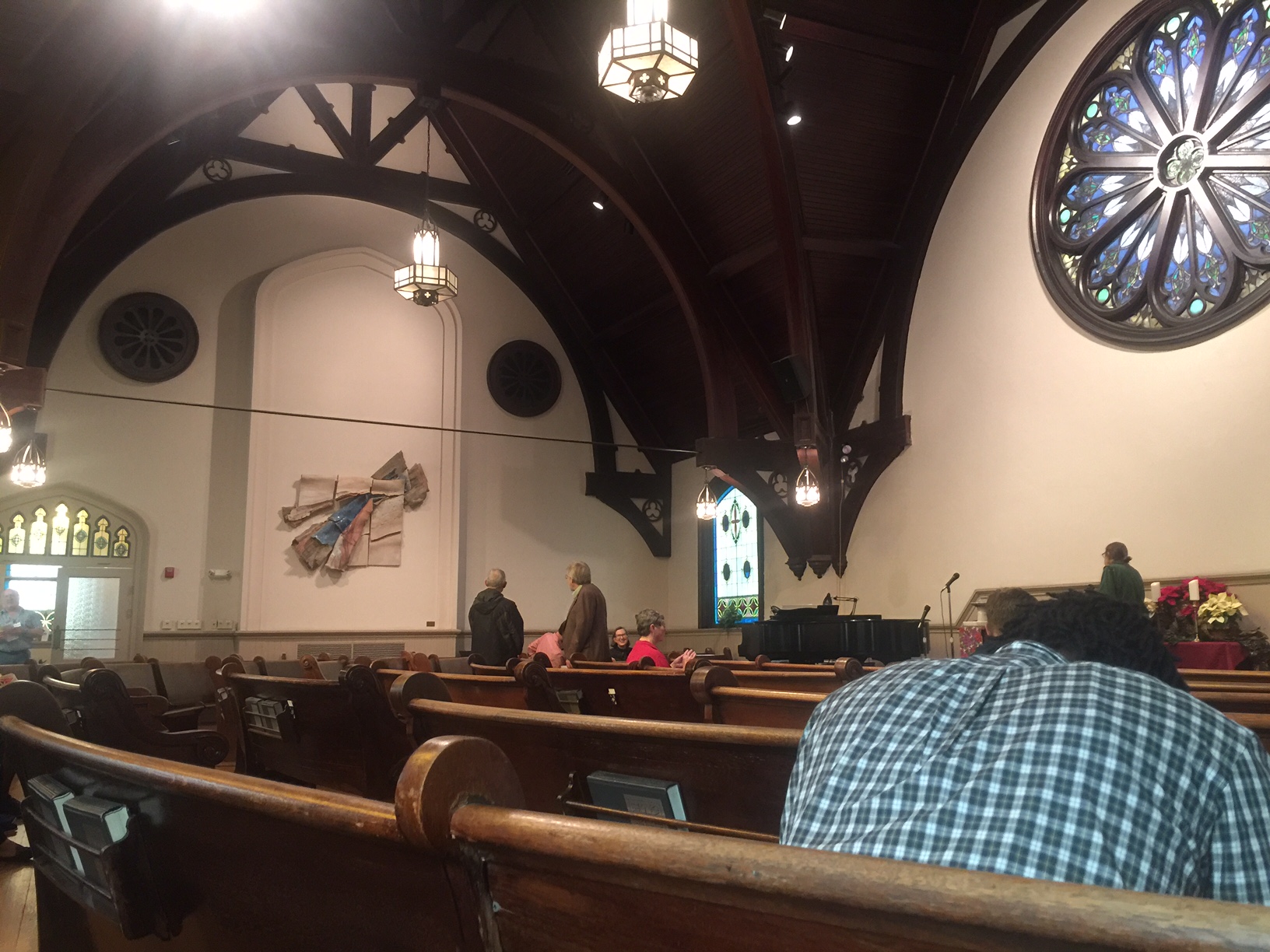An Uncomfortable Truth Led To My Mistake in Church
The other day in church, I made a mistake while helping to lead the service in saying the prayers. I got up too soon and spoke a line in front of everyone before it was my turn. Thankfully, Father Bryan kept moving along after I paused- realizing I had maybe made a mistake because the whole congregation was still standing- not kneeling- and looking confused. Whoops.
How did it happen? I’ve been participating in this part of the church service for nearly 20 years- oh yeah, I mean I started acolyting at church as a nine-year old child. And then leading the prayers when I was either 15 or 16. I’m 35 now so yep, that’s 20 years. Not counting the other however many years of hearing the same service each Sunday that I went to church. That’s one thing about being Episcopalian, there’s a continuity in our Book of Common prayer. Last time we changed it, it made enough people so dang mad that they decided to say they were Anglicans now and some churches even found themselves in lawsuits when they tried to break away. And during our big convention this year, they did not elect to change said prayer-book, something which was met with the rare applause during our church announcements.
But that doesn’t explain how I got so distracted that I literally lost my place in a church service that I know so well. Let me tell y’all what happened.
Our readings this Sunday were about Amos and John the Baptist, and one of the hymns was 325… I’ll get to that in a moment. But like any good sermon, Father Bryan tied Amos and the story of the death of John the Baptist together for us in one coherent message. Generally, I’m taking notes during the service so I can remember my thoughts later- but I let one of my children hang on to my phone, and I use the notepad feature in my phone to take my notes. So I was furiously trying to remember all of my thoughts during the sermon. Thankfully, the sermons are on our website now, and I am able to quote them directly.
“Today’s scripture leaves us with at least one uncomfortable conclusion. We are all messengers. We are entrusted with the message of God’s salvation for humanity. The revelation of God to the world in Jesus Christ, in his life, death, resurrection, and ascension is our message to share freely with the world in both word and action. This message and mission is sacred, but the world may consider it dangerous. It flips the world humanity has created upside down, and threatens our comfortable, self-important existence. We are called to comfort the afflicted. Sometimes we are called to afflict the comfortable. At other times … we are the comfortable. Amos was threatened for delivering God’s message. John the Baptist was killed because of it.”
I don’t think this is a surprise for most people, anyone who has been proselytized to or who has been told to go out and spread the message has heard it. But Father Bryan gets a little deeper:
“It is only natural to avoid change, conflict, and uncertain outcomes. It is natural to want to please those around us. Theologian and pastor Henri Nouwen observes good spiritual leadership can often be confused with the ability to “control complex situations, confused emotions, and anxious minds.” Church leaders often give in to vocal demands of some individual or group to save face or keep the peace. No one wants to end up with their head on a plate. But giving in to world politics, or even Church politics, can hinder the deeper theological reflection a community needs to engage our purpose. Good spiritual discernment helps us explore who we are in various situations of change, transition, or conflict. Are we Herod, Herodias, Salome, or John the Baptist? We must continuously ask if we are making choices that are based in self-protection, or based on God’s transformation of the world.”
Here is where I bristled inside, because so much of world politics these days feels like a slap in the face of Christianity, of any faith that believes in a higher power that wants the best for human kind. Isn’t being a good Christian to go out and tell your word- and isn’t that word to simply love?
“So how shall we begin? How do we embark on our mission as messengers of God? We can start on page 855 of the Book of Common Prayer. “The mission of the Church is to restore all people to unity with God and each other in Christ.” This is proclaimed in Paul’s letter to the Ephesians. We are adopted as God’s children through Jesus Christ. This sense of an intentionally created family fills us with the grace bestowed on us, that all might live for the praise of God’s glory. This is our inheritance … not by our doing, not earned, but by grace. Through Jesus Christ we are included in God’s promise. We are marked as Christ’s own forever, with the seal of the promised Holy Spirit. Perhaps instead of dividing up insiders and outsiders of the faith, we should understand that all those who seek Christ belong to God, not because we are less sinful or do all the right things, but because God bestows infinite grace and mercy upon us all. Through grace, God calls us to unity. This is a message the world needs to hear.
Reconciling ourselves to God and each other is our calling. We are the adopted children of God, and our inheritance is completely gratuitous … a gift. This is an alternate view to the world’s understanding of worth. Our worth is not of ourselves, rather we have been taken up into something extraordinary and offered this gift to receive as our own. This gift calls us to specific tasks of loving and serving God and our neighbor. We are to grow in the knowledge and love of God. Like John, we are to prepare the way of the Lord, lowering ourselves so that Christ might be exalted. We are to be disciples of Christ, loving one another as Christ loves us. We are to recognize God’s love as excessive, tender, and richly abundant. And we are to be apostles, sent forth to be the Body of Christ and reflect Christ to a world in need of the Savior. This is a gift so great we cannot keep it to ourselves. This is a gift we must celebrate and share. We do all of this in faith that God is working with us, through us. We are called to faithfully, fearlessly, deliver this message to the world in word and action.
The Episcopal Branch of the Jesus movement has a unique expression of our faith to offer the world. We offer tradition and theology and liturgy. We also offer love. The Diocese of Atlanta has adopted a clear purpose statement. “We challenge ourselves and the world to love like Jesus, as we worship joyfully, serve compassionately, and grow spiritually.” Presiding Bishop Michael Curry proclaims, “I’ve seen Episcopalians stand with others no one else would stand with. I’ve seen Episcopalians stand with immigrants. I’ve seen us stand with refugees. I’ve seen us stand up for justice, not in the name of secular values but in the name of Jesus Christ, in the name of love. … We do not come in hatred, we do not come in bigotry, we do not come to put anybody down. We come to lift everybody up. We come in love.” This is our message. Let us courageously deliver it to the world. Amen.”
And here is where I got so messed up that I got lost in a service that I know by heart. I looked out into the congregation and… I saw confusion, frowns, some lost in thought. And I wondered, did they miss the message? Or did I miss it?
I’ve seen Episcopalians stand with immigrants. I’ve seen us stand with refugees. I’ve seen us stand up for justice, not in the name of secular values but in the name of Jesus Christ, in the name of love… We come to lift everybody up. We come in love.
I’ve heard this quote from Presiding Bishop Curry before, and to me it is the core of all of Christianity. But how can we say this is not political?
The thing I realized, as I was so lost in my own thoughts that I didn’t even hear was what said next, was of course it’s not. Of course it’s not political. Loving everyone is exactly what we are commanded to do and it comes straight from God. Straight from so many parts of the Bible, it’s easy to look it up:
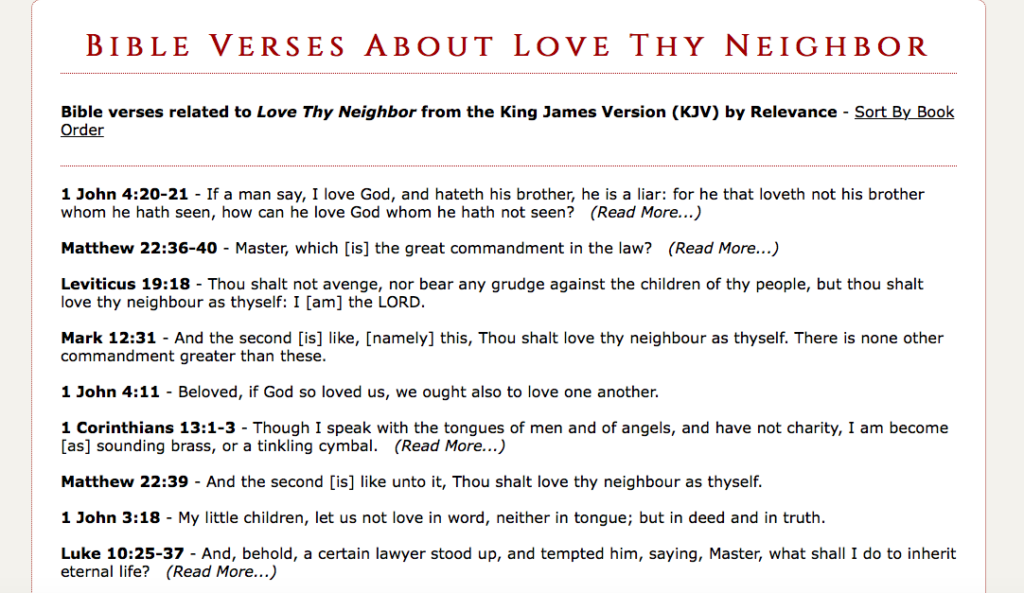
(from https://www.kingjamesbibleonline.org/Bible-Verses-About-Love-Thy-Neighbor/ )
It’s not political but we make it that way. Our leaders make it that way. The communion hymn was “Let us break bread together on our knees”-
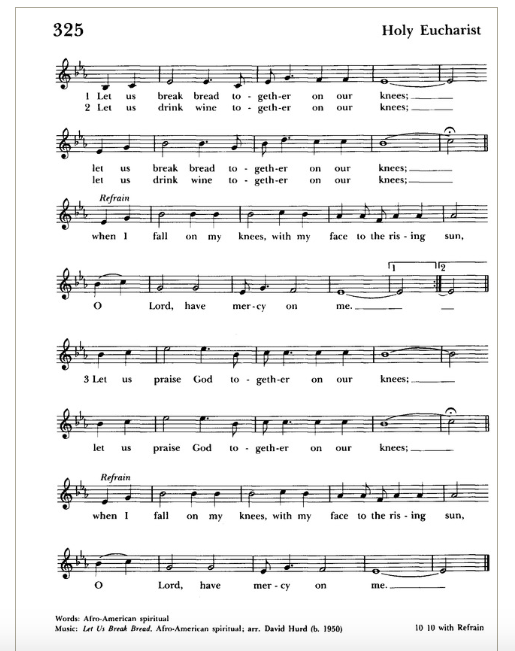
It’s from an African-American spiritual, songs that were made up and sung by a people who were enslaved- the very essence of not loving ones neighbor. Chattel slavery… something that was also once justified by the word of God being twisted into something it’s not.
So in church I was faced with an uncomfortable truth: loving one’s neighbor is hard. I fail at it often. But we are called to keep trying. Not because it’s the politically expedient thing to do, but because it’s the Christian and right thing to do.
Bishop Wright gave a sermon once about John the Baptist once… about how he was a troublemaker. And that Jesus Himself will mess you up and turn your life upside down, and I think this is another one of those times.
See Father Bryan’s original sermon here.
Love to all y’all,
Molly


